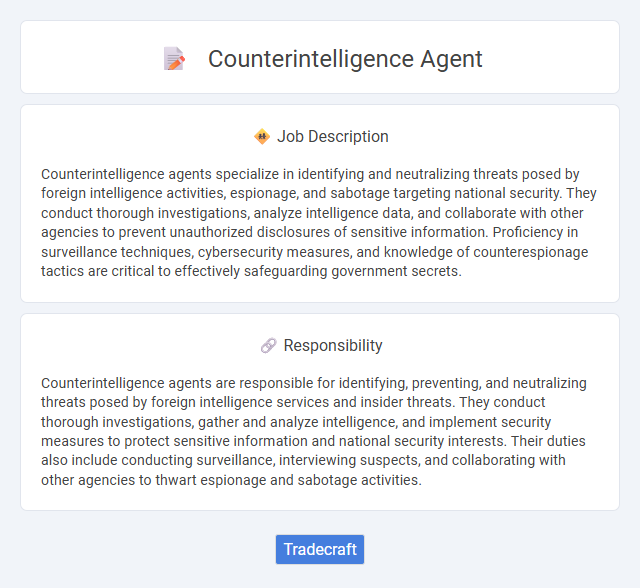
Counterintelligence agents specialize in identifying and neutralizing threats posed by foreign intelligence activities, espionage, and sabotage targeting national security. They conduct thorough investigations, analyze intelligence data, and collaborate with other agencies to prevent unauthorized disclosures of sensitive information. Proficiency in surveillance techniques, cybersecurity measures, and knowledge of counterespionage tactics are critical to effectively safeguarding government secrets.
Individuals with a high level of discretion, analytical thinking, and emotional resilience are likely to be suitable for a counterintelligence agent role, as the job often involves navigating sensitive and high-pressure situations. Those who are comfortable working in secrecy and can handle unpredictable environments might have a higher probability of success. However, people prone to stress or difficulty maintaining confidentiality may find this career challenging and less fitting.
Qualification
Counterintelligence agents require a strong background in criminal justice, national security, or related fields, often holding a bachelor's degree or higher. Proficiency in foreign languages, cybersecurity, and analytical skills is essential to detect and prevent espionage activities. Candidates must also pass rigorous background checks, obtain security clearances, and demonstrate physical fitness and psychological resilience.
Responsibility
Counterintelligence agents are responsible for identifying, preventing, and neutralizing threats posed by foreign intelligence services and insider threats. They conduct thorough investigations, gather and analyze intelligence, and implement security measures to protect sensitive information and national security interests. Their duties also include conducting surveillance, interviewing suspects, and collaborating with other agencies to thwart espionage and sabotage activities.
Benefit
Counterintelligence agents likely offer significant benefits such as protecting national security by detecting and preventing espionage activities. Their work probably enhances the integrity of sensitive information, reducing the risk of data breaches. This role may also provide opportunities for skill development in analysis, surveillance, and critical thinking, potentially leading to career advancement within intelligence and security sectors.
Challenge
The role of a counterintelligence agent likely involves navigating complex and high-stakes environments where identifying and thwarting espionage activities is a continual challenge. Agents probably face the difficulty of distinguishing between legitimate activities and subtle, covert threats, requiring sharp analytical skills and vigilance. The constant evolution of intelligence tactics may also demand ongoing adaptation and resilience to stay ahead of sophisticated adversaries.
Career Advancement
Counterintelligence agents advance their careers by developing expertise in threat analysis, cyber espionage, and intelligence gathering techniques. Progression often involves specialized training, obtaining security clearances, and gaining experience in field operations or cybersecurity domains. Leadership roles typically require strong analytical skills, successful case resolution, and continuous professional development through government or agency-sponsored programs.
Key Terms
Tradecraft
Counterintelligence agents specialize in tradecraft techniques such as surveillance, covert communication, and encryption to identify and neutralize foreign intelligence threats. Proficiency in tradecraft enables these agents to conduct clandestine operations, gather critical intelligence, and protect sensitive information from espionage. Mastery of tradecraft tools and methods is essential for preventing infiltration and ensuring national security.
 kuljobs.com
kuljobs.com